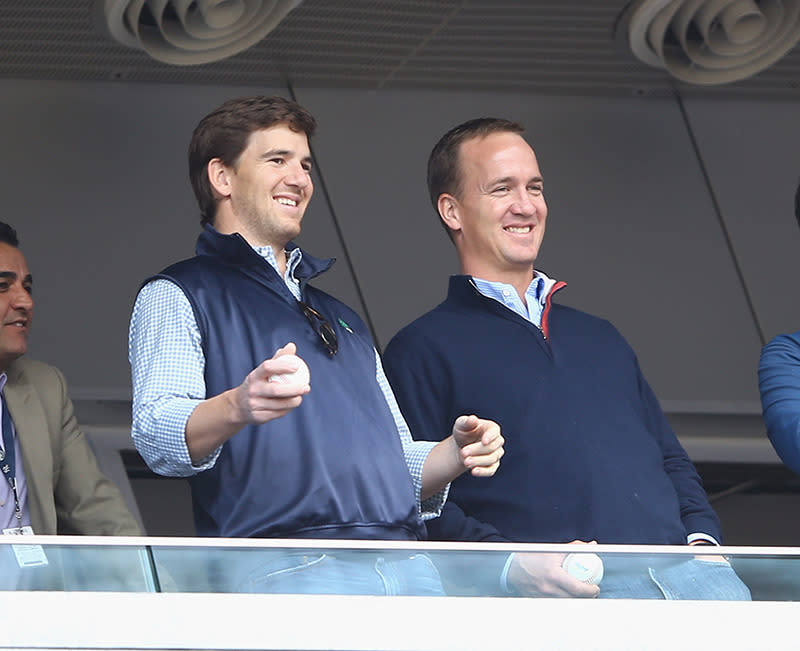Peyton vs. Eli Manning: Inside Sibling Rivalry

Denver Broncos fans were wowed by their team’s unexpected Super Bowl win — all, at least on the face of it, but Eli Manning, fellow NFL player and younger brother to Broncos quarterback Peyton Manning, who cinched the second Super Bowl win of his career Sunday night.
“When the camera panned to the Mannings in a luxury box during the fourth quarter, the Giants quarterback, almost expressionless, stared blankly ahead as his joyful family celebrated around him,” noted the Daily News. “Why?”
STORY: Beyoncé’s Private Moment With Blue Ivy, Jay Z at the Super Bowl
It was not the only place to pick up on the disturbed-looking reaction of Eli, also a two-time Super Bowl winner. A Vine video of the moment, posted by Basketball Insiders editor Alex Kennedy, had more than 31 million loops by Monday afternoon. That prompted a surge of tweets around Eli’s expression, with quips such as, “When your brother brings home a better report card than you,” “Eli Manning is sad,” and “Eli Manning was absolutely THRILLED to see Peyton win last night.”
STORY: ‘Blind Side’ Mom on Super Bowl-Bound Son’s Inspiring Journey: ‘Don’t Count People Out.’
MSN wrote about the suspected sibling rivalry between the two athletes. “We have little doubt that Eli was happy for his brother to get another Super Bowl, but the funny thing to joke about is that he may be bitter,” wrote Larry Brown. “With Peyton winning, Eli loses the one advantage he held over his far more accomplished bro: Super Bowl rings. With Peyton winning Super Bowl 50, both Manning brothers now have two rings.”
Competition must have been fierce growing up, as the brothers have a demanding, eagle-eyed, football-hero father — one who, earlier this season, said he thought Peyton’s career was over due to a foot injury. An older brother, Cooper, has lifted himself out of the scrum altogether by becoming a stock trader and TV sports host after a congenital spinal condition sidelined his own early chances at football.
Still, after Sunday’s game, Peyton attempted to shut down chatter about rivalry and ring comparisons. “We don’t do that, that’s not what we do. Maybe you guys, your brothers do that, that’s not what we do,“ he told CBS News. "I just had a chance to see Eli and it’s great being with him and having a moment with him in the locker room. I remember being in the locker room with him on his first Super Bowl and those are special, special memories.”

Eli, left, and Peyton Manning. (Photo: Getty Images)
In the past, Eli told USA Today that his purpose at the game was to “watch as a little brother, rooting for my big brother to go out there and play well.”
But the idea of sibling rivalry, especially in such a driven family, certainly wouldn’t be unheard of.
“We don’t know why Eli Manning looked so blank, and I don’t want to criticize someone for a facial expression. But yes, it is certainly probable that a father who raised his children to think that their value in his eyes depended on their football achievements, would feel competitive with his brother about those achievements,” Dr. Laura Markham, clinical psychologist and author of Peaceful Parent, Happy Siblings, tells Yahoo Parenting. “Which would make for some emotional confusion when his brother has such a triumphant public moment. Obviously, he wants to support his brother. But his self-esteem might depend on being the best in the family, so a big achievement by his brother might threaten his ability to feel good about himself, despite his best intentions.”
Sibling rivalry is rooted in basic needs, Markham explains, and “competition for what can seem like scarce resources — the parent’s time, attention, admiration, appreciation.”
It’s also inherent, Dr. Jane Greer, family therapist, radio host, and author of Adult Sibling Rivalry, tells Yahoo Parenting. And when handled correctly, it can be healthy. “When it’s acknowledged and managed by parents, it can help kids balance inequalities in life, and can be used as a source that can help kids grow and learn in a positive way,” she says. “It can be a motivating force and spark competition.”
But when parents use it in a comparative way, Greer adds, “it can be devaluing, and it can really fire up resentment, jealousy and envy that can be toxic, leading to contention and even rage” among siblings.
To help prevent such rivalry fostering competition, Markham suggests, “parents need to show children by their actions that no matter how much (love, cake, admiration) a sibling gets, there is always more than enough for each child.”
Pitting kids against each other, on the other hand, teaches that a child is not okay unless he or she is better than the sibling. “This becomes a habit of relating, so that kids learn to think of themselves in relation to their sibling, instead of based on their own merits,” she warns. “This habit can be exacerbated later in life when kids choose the same careers — which can be a telltale sign that the parent pushed that profession as the only one that is of value. It helps soften the competition if kids can go into different professions so they measure themselves against their own goals, rather than a sibling’s achievements.” Score one for Cooper, then.
(Top photo: Getty Images)
Please follow @YahooParenting on Facebook, Twitter, Instagram, andPinterest. Have an interesting story to share about your family? Email us at YParenting (at) Yahoo.com.


